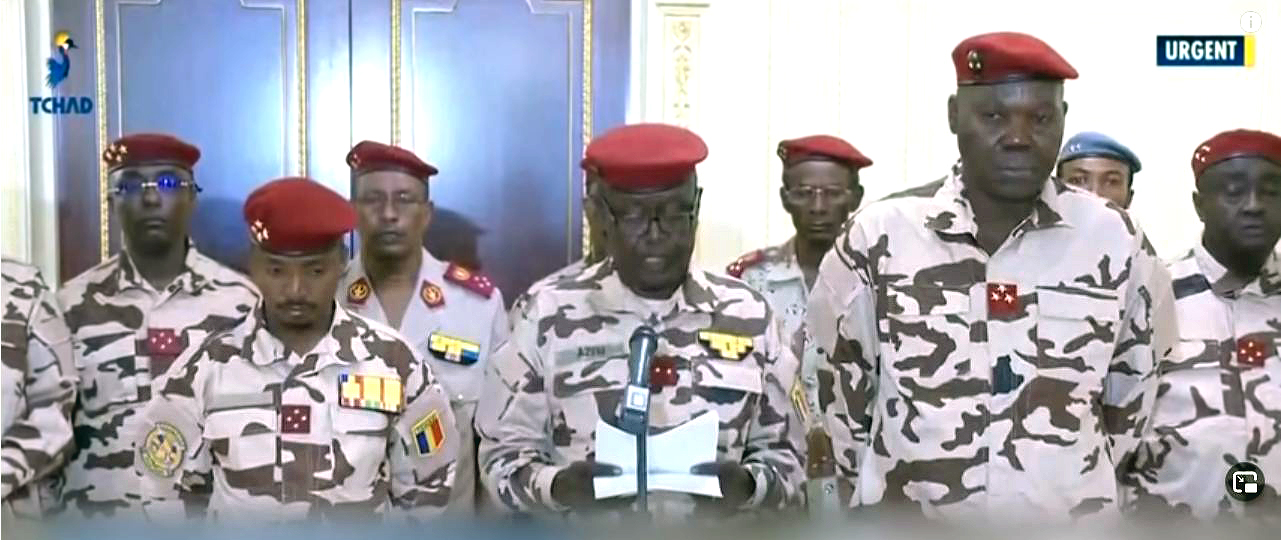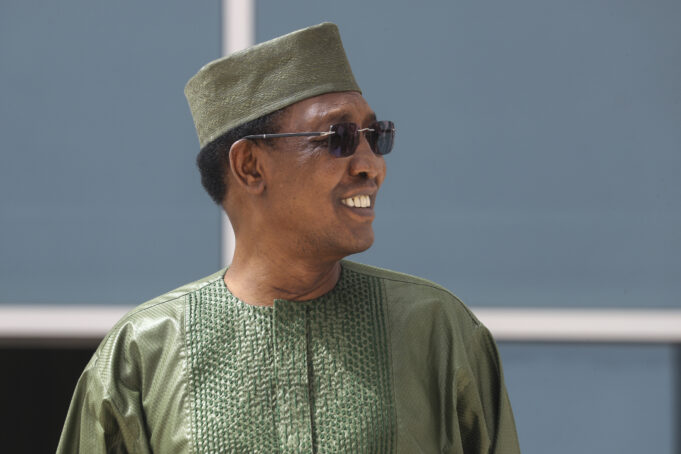What are the chances in 2021 of a world leader dying on the battlefield? asked France24 news commentator Francois Picard. Chad’s longtime president and military leader for 31 years recently died from wounds sustained after going to a military front.

President Idriss Deby, who received military training as a pilot in France and last year took on the title of marshal, had gone to face down another rebellion.
Media reports of foreign terrorism intervention appear exaggerated and used to justify the incursion of French troops in Chad with United States’ support.
Deby’s death at age 68 came the day after the strongman won an easy reelection, if it can be believed, with almost 80 percent of the provisional vote.
The announcement of the battlefield death came after an election in which he won a sixth term in office, reported the Guardian. “Some observers fear there could be extensive fighting in the strategically important central African country before a stable political settlement is reached,” the Guardian said.
Reports from the capital city N’Djamena suggest parliament has been dissolved and government replaced by a transitional military council led by Déby’s 37-year-old son, General Mahamat Idriss Déby Itno.

In a statement on national TV, an army spokesperson issued a call for “dialogue and peace … to all Chadians in the country and abroad in order to continue to build Chad together.”
France is in Chad supposedly to support a “war on terror,” yet its most recent targets have all been political rebels.
According to the English translation, by africanarguments.com, of a piece titled “Airstrikes and stability: What’s the French army doing in Chad?” (originally published in the Liberation) France has a long history of involvement in its former colonies and Chad. “In fact, Chad has experienced more French military interventions since (1960) independence than any other African country,” the piece noted.
French “intervention” came at the request of Chadian authorities including Deby, “who welcomed France’s cooperation and the ‘neutralization’ of the (rebel) fighters,” reported africanarguments.
French justifications for its African presence and its military techniques have changed in important ways. In the 1960s and 1970s, reported africanarguments.com, “the former colonial power waged a counter-insurgency war against the Chad National Liberation Front (Frolinat). In 1986, France then established Operation Epervier (Sparrow hawk) to contain Libyan expansionism. Chadian dictator Hissène Habré—who was sentenced in 2017 for war crimes, crimes against humanity and torture—was a key ally of France and the U.S. against Gaddafi.
“Then as now, France supported the existing regime in the name of ‘stability,’ and over the decades, France’s military presence has allowed it to prop up subsequent regimes in Chad. They first supported Habré before switching allegiance to Idriss Déby who has been president since seizing power with French support in 1990.
“Since then, Déby has faced several serious rebellions. In both April 2006 and February 2008, rebels even managed to reach the capital N’Djamena. France’s support at these times was more discreet than today. It involved sharing intelligence with the Chadian army, ‘shows of force’ (low-level flight over the rebel column) and warning shots. In 2008, it also included facilitating the supply of ammunition from Libya and protecting the capital’s airport.
“In 2019, however, the French approach has changed significantly. They are no longer content to create conditions favourable to a victory for the Chadian army: they launch airstrikes against rebels themselves.”
Dr. Nathaniel K. Powell, a historian whose focus has been the history of postcolonial Franco-African relations and graduate of the Graduate Institute of International and Development Studies in Geneva, has done two decades of research and uncovered France’s successful counterinsurgency efforts designed to protect regimes beginning with Chad’s first president.
In his book “France’s Wars In Chad: Military Intervention and Decolonization in Africa,” he reveals French efforts to counter Libyan interventions and the rise to power of Hissène Habré, one of postcolonial Africa’s most brutal dictators. Powell writes French strategies aimed at preventing the collapse of “authoritarian regimes” have been dismal failures. In fact, French efforts have had the opposite effect, Powell argues, exacerbating tensions, increasing violent conflicts and foreign interventions in Chad and elsewhere.
Deby’s tainted history
The Italian Institute for International Political Studies in 2019 said Deby played his hand cleverly. “By placing Chad at the center of international efforts to counter terrorism in the Sahel, he has deflected attention from the domestic political and economic problems besetting his country. He has also successfully exploited the ambiguities of the ‘war on terrorism’ to brand political opponents as ‘terrorists,’ a convenient shortcut that legitimizes the ‘neutralization’ of rebel political movements,” said the institute.
DW.com, the German publication, says by the time Chad had become an oil-producing country Deby had emerged as a self-styled strongman. “Instead of diversifying the economy, modernizing its infrastructure or spending oil profits evenly throughout Chad, he took a different approach. He viewed his country’s newfound revenue not as belonging to the people, as one would expect, but rather as his own money—which went straight into his family’s pockets,” and towards the purchase of military hardware to fight the ever growing insurgency, said DW.com.
In a statement, the French presidency described Deby as a “brave friend” and affirmed its attachment to Chad. Over the years, France has deployed troops and fighter jets to push back Deby’s opponents, reported the BBC.
France’s 5,000 man so-called anti-terror force, Operation Barkhane, is based in N’Djamena. Deby’s four-star general son was swiftly named transitional leader at the helm of a military council, despite constitutional protocol saying that the speaker of the parliament should have taken power. The military also suspended the constitution, dissolved the government and parliament, but pledged to hold “free and democratic” elections after 18 months, reported Al Jazeera.
“Chad is not a monarchy,” the rebel group FACT said in a statement posted online after the announcement of Deby’s death. “There can be no dynastic devolution of power in our country,” the group said, vowing to depose the new leader.
The developments, according to Al Jazeera, “have raised the spectre of a new and potentially violent power struggle in Chad, which has endured successive rebellions since independence from France in 1960. Deby himself took power spearheading a 1990 rebellion that overthrew authoritarian leader Hissene Habre, and later faced the same threat of being overthrown—rebel forces reached the capital in 2006 and 2008, before they were forced to withdraw, and came close again in 2019.”
Follow @jehronmuhammad on Twitter.













